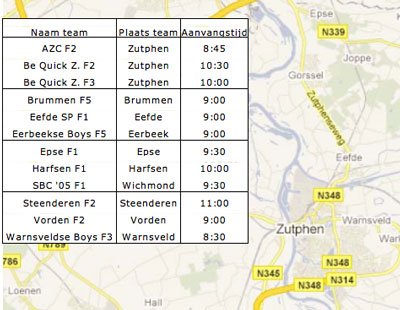 | Fair competition? Math Alympiad preliminary 2009 | © freudenthal institute | 13 views | Home | |
The activity
 | Fair competition? Usually, in competitions between sports clubs from different towns the clubs play against each other once. That means that, over the course of a season, each club will play several away matches, as well as home matches. In this assignment, we will take a closer look at a number of different competition setups. We will take a look at the UEFA Cup for the season 2004 - 2005. This is an international football competition, organised by UEFA (Union of European Football Associations), where the participating teams are divided into groups of five to play a mutual competition. In this competition the teams all play each other once. In addition all teams play two home matches and two away matches. |
Background information
|
Math A-lympiad The Mathematics A-lympiad is a real-world-mathematics-problem-solving competition for teams of students forom uppe secondary schooles, with open ended assignments. The open assignments are designed by the A-lympiad committee, a committee residing at the Freudenthal Institute of Utrecht University in the Netherlands, that organizes the Mathematics A-lympiad since 1989. The aim is to elicit students to think mathematically, to solve open-ended unfamiliar problems in a creative way, to model, structure and represent problems and solutions, to work collaboratively and to communicate about mathematics. The task is set in a non-mathematical real life (often work related) situation that asks for mathematical modelling and problem solving. The final product is a report fitting the real-life context of the task. Math in teams During the Dutch Mathematics Day Contest students work in teams of about 3 to 4 members on an open mathematical problem solving task during a couple of hours. The product of this work is a report (and sometimes a presentation). |
Using your skills in a new setting
|
| Freudenthal Institute: Home - Utrecht University | Freudenthal Collection: Home - Showcase - Archive | Subset: Math A-lympiad |